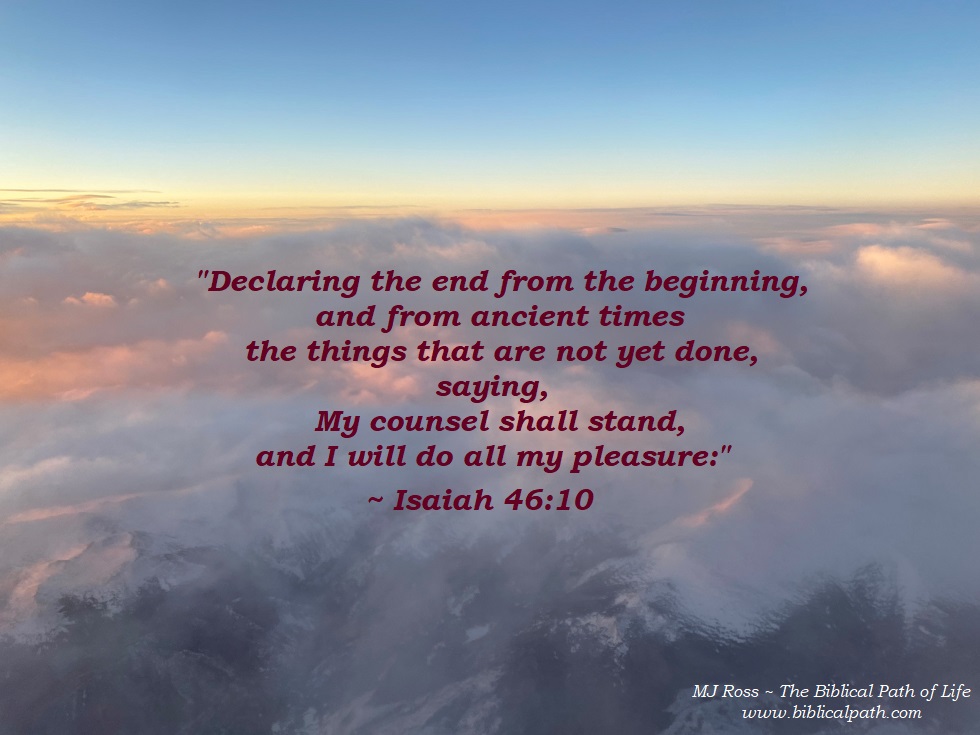
“Declaring the end from the beginning, and from ancient times the things that are not yet done, saying, My counsel shall stand, and I will do all my pleasure:”
Isaiah 46:10
Have you ever considered the fact that God knows all things, even the things that have not happened yet? As you read your Bible, do you ever notice instances such as these? Sometimes it is just fun to dig into God’s Word and chase down some verses to see where they take you. Often times one will be amazed at the omniscience of God. Consider the following quick run through a certain family line.
Isaac Rebecca had twin boys, Esau and Jacob. Jacob chose to follow God, and Esau chose to become a profane person (Hebrews 12:15-17). Esau’s descendants became the enemies of God’s people (who were the descendants of Jacob). They had many conflicts through the years. Check out just one of these descendants, Amalek, Esau’s grandson and his lineage.
Moses had led God’s people out of Egypt, and a people came against them. “Then came Amalek, and fought with Israel in Rephidim” (Exodus 17:8). Joshua led the people to a great victory, while Aaron and Hur held up the arms of Moses (see Exodus 17:8-16). Moses understood that they would have war with Amalek (the Amalekites) from generation to generation.
When Moses sent twelve spies into Canaan land to bring back a report, we learn that the Amalekites lived in the land of the south (Numbers 13:29). When the spies returned, ten did not believe God would allow them to conquer the land while two, Joshua and Caleb, declared they should go and posses it because they believed God (see Numbers 13:1-33). The people listened to the ten who said they should not go (Numbers 14:1-39). Because they did not like the response of God for their disobedience, they decided to go and try to take the land of Canaan – without the Lord (see Numbers 14:40-45). It was then that the Amalekites and Canaanites defeated God’s people.
When Moses was preparing the new generation to enter into the Promised Land (the land of Canaan), he gave many instructions. Read one of the following: “17. Remember what Amalek did unto thee by the way, when ye were come forth out of Egypt; 18. How he met thee by the way, and smote the hindmost of thee, even all that were feeble behind thee, when thou wast faint and weary; and he feared not God. 19. Therefore it shall be, when the LORD thy God hath given thee rest from all thine enemies round about, in the land which the LORD thy God giveth thee for an inheritance to possess it, that thou shalt blot out the remembrance of Amalek from under heaven; thou shalt not forget it” (Deuteronomy 25:17-19). However, there is no mention of eliminating the people of Amalek found in the book of Joshua.
If you remember, because they did not eliminate the enemies of Canaan land, they then became a thorn in the side of God’s people. God’s people would forget Him, God would allow the enemy to oppress His people, the people would cry out to God, and God would send a deliverer. We can read that the Amalekites were one of their enemies (see Judges 3:12-13). One of the most famous encounters in the book of Judges is when the people of Amalek joined the Moabites and went up against the Israelites when God rose up Gideon to be their judge (see Judges 6-7). We read that God allowed Gideon to defeat them with only 300 men. However, God delivered His people from the Amalekites other times in the book of Judges (see Judges 10:11-12).
Years later, when Saul was king, God wanted the Amalekites destroyed. “2. Thus saith the LORD of hosts, I remember that which Amalek did to Israel, how he laid wait for him in the way, when he came up from Egypt. 3. Now go and smite Amalek, and utterly destroy all that they have …” (1 Samuel 15:2-3). God even told them why He wanted them destroyed. You may remember that Saul kept the king, Agag, alive with some of the oxen and sheep. When Samuel asked King Saul about it, Saul declared he had obeyed God. Nevertheless, because he had not, God removed the kingdom from Saul. Samuel did what King Saul had refused to do: kill King Agag. A few years later, David fought the Amalekites (see 1 Samuel 27:8). The Amalekites invaded and stole the wives of David and his men (see 1 Samuel 30:1-20). David again defeated them. Not much else is mentioned about the Amalekites. However, one may notice that something interesting happens. We meet someone who is an Agagite.
Most people remember the events of Esther. The enemy of the Israelite people (the Jews) is Haman. “And the king took his ring from his hand, and gave it unto Haman the son of Hammedatha the Agagite, the Jews’ enemy” (Esther 3:10). Notice he is the Agagite. He was most likely a descendant of Amalekite kings (remember King Agag that Saul was to kill). Haman plotted to annihilate the Jewish people. Because of Queen Esther’s obedience and bravery, she was able to save her people. Moreover, Haman the Agagite (and his ten sons) was hanged. We do not read of the Amalekites or the Agagites coming against God’s people again. Does this help you understand why God repeatedly told His people to “blot out the remembrance of Amalek from under heaven” (Deuteronomy 25:19)?
Do you believe that God knows the end from the beginning? “Declaring the end from the beginning, and from ancient times the things that are not yet done, saying, My counsel shall stand, and I will do all my pleasure” (Isaiah 46:10).
Do you recognize God has a plan because He knows all?Have you chosen to do what God has planned for your life, much as Esther obeyed God’s plan?
